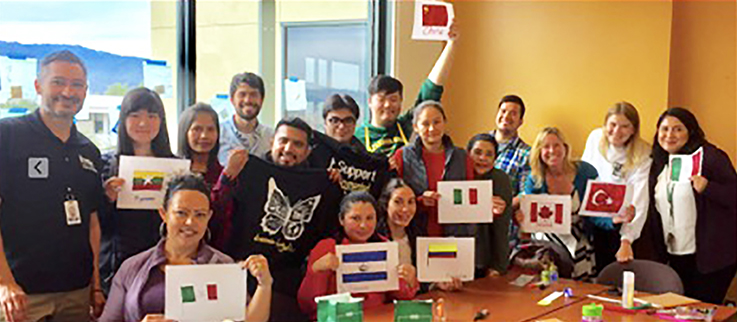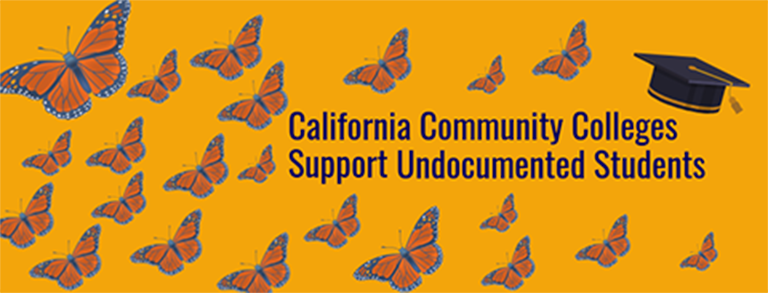May 2020 Advocate: Undocumented students more vulnerable than ever
SUPPORTING UNDOCUMENTED STUDENTS
Undocumented students more vulnerable than ever. Faculty can make a difference
By Jessica Silver-Sharp, AFT 1493 Secretary
When I first wrote about our undocumented students for The Advocate in October 2017, I couldn’t have foreseen how things could change so much in less than three years. Two out of three of our campus Dream Centers were established during this time when young “Dreamers” were forming a national youth movement and “coming out” across the country. Then, the majority of SMCCD’s hundreds of undocumented students enjoyed legal protections under DACA. Now, the majority are not eligible for DACA and the significant legal protections, work opportunities and unemployment benefits that status affords. For these reasons, more than ever before, they form our most vulnerable student population.
For this article, I spoke with many folks, including our three campus Dream Center program service coordinators, who with major support from faculty allies and administrators, have transitioned to serve our undocumented students remotely. I wanted to get a better sense of how things had shifted for undocumented students following our campus closures. What are the challenges Dream Center staff and their students are facing? But I also wanted to bring attention to the availability of recent programs and events that continue to make an impact. Lastly, I wanted to learn how faculty members might increase our awareness, support and understanding in this new landscape.
COVID has accentuated undocumented students’ focus on supporting their families
In our conversations, Center staff reported that the pandemic has truly revealed the priorities of these students in ways many of us don’t realize. More likely to live in multi-generational households, our undocumented students report they are working more to support themselves and immigrant parents who lack unemployment benefits. Some have taken new jobs doing essential services. Many have also found themselves responsible for the care and homeschooling of younger siblings, as parents lack the benefit of an education or language to support their children with academic tasks. Some have withdrawn from classes.
Food and housing insecurity and a political climate that continues to actively inspire fear of deportation for students and their family members have been exacerbated by COVID. Even before COVID, students reported widespread anxiety resulting from misinformation about the Public Charge Rule policy and the Supreme Court’s looming decision on DACA. Now students report a host of new and significant challenges, including staying healthy but also around household competition for internet service, the difficulty of finding a quiet space to study, anxiety about the transfer process in progress, and the knowledge that money saved for transfer to university is now being rerouted to basic necessities. From a cultural standpoint, many students are also unaccustomed or uncomfortable negotiating with faculty–for assignment changes, for example–no matter how valid the reasons. Staff report that when taken together, these factors have produced anxiety levels among undocumented students that are unprecedentedly high.
Dream Centers work to maintain student support
For the Dream Centers, among the biggest challenges are in finding ways to continue, or rather recreate, a sense of community for students accustomed to having a physical space on campus that feels safe. For Cañada students, Undocu Club meetings are on hiatus but students keep in touch.
 Cañada College Undocu Club members with allies
Cañada College Undocu Club members with allies
The other two campuses are currently without student clubs, most members having graduated. At CSM’s Multicultural and Dream Center (MCDC), community building continues at student-led weekly Zoom Hangouts where the focus is on social justice and related issues.
A parallel challenge has been continued referrals to basic but essential services and resources. The MCDC uses a robust case management approach that helps connect students with academic counselors, retention specialists and other campus resources. Meanwhile, triage between Center staff and student services specialists and referrals to free campus legal clinics and local organizations takes place across the district. Staff proactively check in with students to make sure they are safe, and reach out to matriculating students as well. Each Dream Center does things a little differently, but for all, core program services remain in place. What’s changed is outreach.
At Skyline, Pam Ortiz Cerda makes and takes personal calls from students at all times of the day and evening, including weekends when students return home from work. Pam is trained and experienced with DACA renewal applications — she assists students and their family members from all three campuses through a complex process that includes several long forms and an additional application to non-profit funders to cover DACA renewal fees of almost $500. She also encourages her students to participate in mental health and wellness virtual sessions offered by the non-profit organization, Immigrants Rising, twice weekly. In their work “to get resources out there,” the Centers publish frequent Dream Center email newsletters with resources for food and other aid, fact checked by student assistants for currency and accuracy. All three Centers also reach students through Dream Center Instagram accounts.
Many faculty AFT members have become more aware of the needs of our undocumented students by actively participating in this year’s Undocumented Student Week of Action events, which included an astounding breadth of programs (deserving of their own article). Nationally, AFT’s platform of support for these students stems partly from an understanding that our current students are our nation’s future teachers. So how can faculty members help?
What do undocumented students need?
• A safe space to share experiences and ideas in a two-way dialog with faculty who are sensitive not to “out” them to their classmates.
• Faculty who are aware of federal and state laws and resources. Some students have been misinformed by us about their options, especially regarding DACA and state/federal benefits.
• Guidance that can increase their confidence and help them build resilience. Not sympathy.
• Assignments that don’t exclude or harm. We can’t assume our students can vote to make political change, or want to debate (or be debated) when immigration is the research assignment topic.
What can faculty do?
• Contact your campus Dream Centers about any student you think needs support. Dream Center staff will reach out to our students in person by phone. (If you’re unsure of their status, it’s okay; immigrant or low-income students who are not undocumented are also served).
• Stay informed about campus/community resources by subscribing to each campus’s Dream Center newsletter by emailing: Cañada, Saúl Miranda mirandas@smccd.edu Skyline, Pamela Ortiz Cerda ortizcerdap@smccd.edu and CSM, Jackie Santizo santizoj@smccd.edu
• Join your campus Dream Center Task Force. Task Forces of staff and faculty members continue regular virtual meetings during this crisis by Zoom. Email the same contacts above.
• Show solidarity by donating a part of your federal stimulus check. Undocumented students did not receive these and are not eligible for CARES Act funds. A Skyline work group is on this: Contact Counselor Mandy Lucas Lucasm@smccd.edu for more information now.
• Attend the Cañada College Undocumented Student Success Town Hall on Friday, May 8, from 2:30-4 p.m. which will provide resources to support our undocumented student community. Register in advance for this webinar: https://smccd.zoom.us/webinar/register/WN_CfLEuUmPSu6T-aaVdwEidw
Post script: Special thanks to faculty counselor Sylvia Aguirre-Alberto whom I spoke with for this article. Sylvia retires this month following decades of service to our undocumented student community. A student herself in CSM’s College Readiness Program during the 1970s, Sylvia’s counseling work for CSM has continued the spirit of her college’s early efforts to create a welcoming community and safe zone for our neediest students. She quotes her mentor, Adrian Orozco, when she reminds us, the first step to wisdom is kindness.

